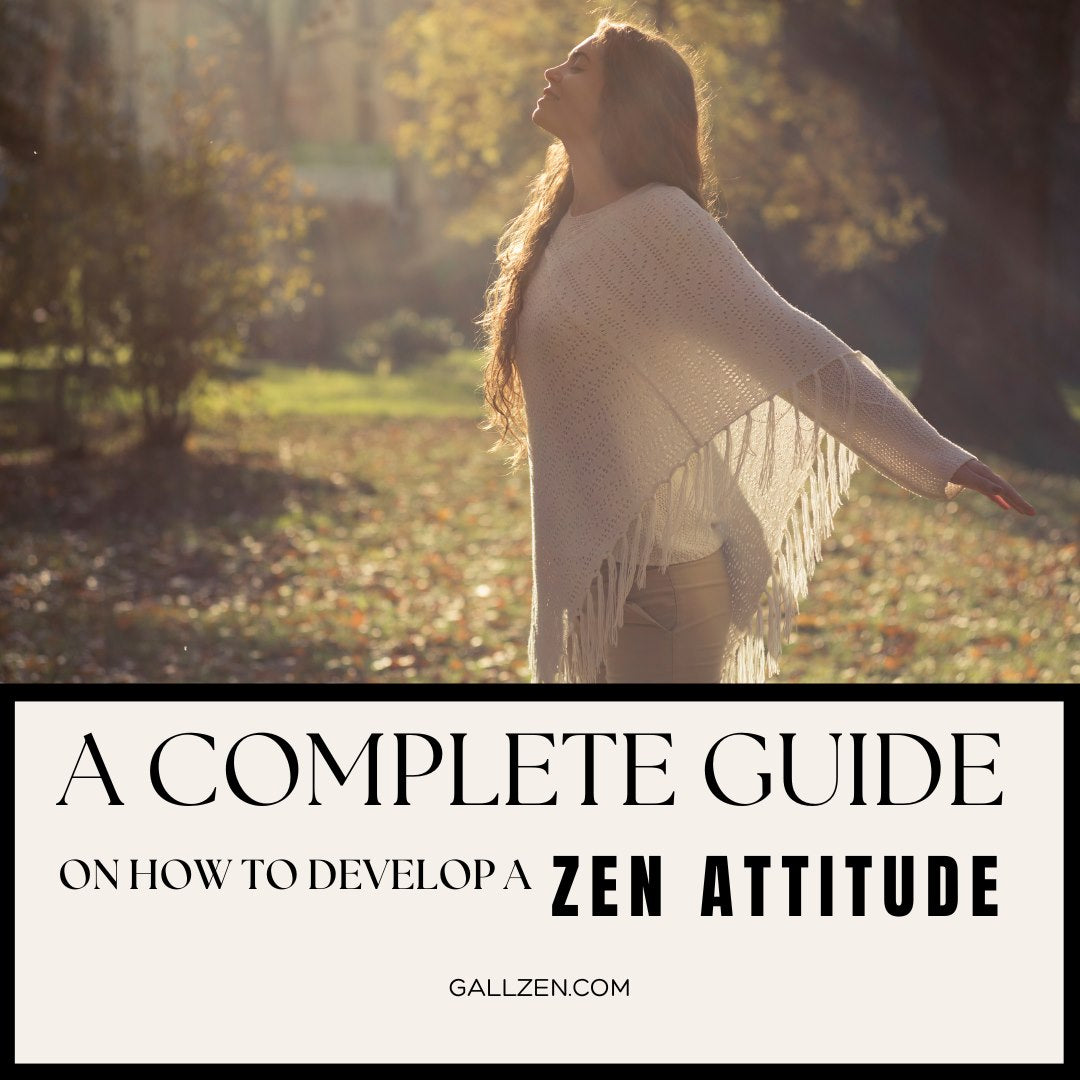
A Complete Guide on How to Develop a Zen Attitude
Share

In a world full of constant distractions, stress, and pressure, finding inner peace often feels like a distant dream. We hear phrases like “stay calm,” “be mindful,” or “practice Zen,” but how can we cultivate a true sense of Zen in the middle of life's chaos? Is it possible to develop an unshakeable, peaceful mindset, or are we doomed to ride the waves of stress forever?
This guide will help you understand what it means to have a Zen attitude and, most importantly, how you can develop it. By the end, you’ll have practical steps on how to integrate a Zen attitude into your everyday life, leaving you feeling more centered, peaceful, and grounded.
What is a Zen Attitude?

At its core, a Zen Attitude is a way of being. It’s a form of Buddhism that emphasizes meditation, mindfulness, and direct experience over intellectual knowledge. But a Zen Attitude isn’t just for monks or spiritual seekers—it’s a philosophy that can be applied to anyone’s life.
A Zen attitude is about being present in the moment, accepting things as they are, and responding to life calmly and thoughtfully. The goal is not to escape challenges but to face them with a clear and balanced mind.
"The mind is everything. What you think, you become." – Buddha
The concept of Zen originated in ancient Eastern cultures, its principles are timeless and universal. Whether you’re dealing with personal stress, work pressure, or simply navigating daily life, cultivating a Zen attitude can significantly improve your overall well-being.
Steps to Cultivating a Zen Attitude
1. Practice Mindfulness Daily

Mindfulness is the cornerstone of Zen Attitude. It’s the art of paying full attention to what’s happening in the present moment without judgment. Practicing mindfulness allows you to slow down and experience life more deeply, rather than getting caught up in worries about the future or regrets about the past.
Start with small moments—whether you’re eating, walking, or simply breathing. Focus on the sensations, sounds, and emotions you’re experiencing right now. Over time, this practice helps quiet the mind and builds a stronger connection with the present.
Tip: Start a Mindfulness Journal
Journaling is a powerful way to enhance mindfulness. Each day, take a few minutes to write about your experiences, thoughts, and feelings. This practice not only helps you reflect but also reinforces your ability to stay present.
2. Embrace Simplicity

In Zen, simplicity is key. The more cluttered your environment and mind, the harder it is to remain calm. Minimalism—whether in your home, your work, or your mental space—can bring a deep sense of peace.
Think of simplicity as decluttering the noise from your life. This doesn’t just mean physical possessions, but also unnecessary thoughts, distractions, and commitments. By focusing on what truly matters, you create space for a more peaceful, centered existence.
Actionable Step: Declutter Your Environment
Start by organizing one part of your living or working space. Clean out unnecessary items and keep only what adds value to your life. Notice how an uncluttered environment can immediately make you feel more peaceful and relaxed.
3. Meditate Regularly

Meditation is the most direct way to cultivate a Zen attitude. Through meditation, you train your mind to focus, stay calm, and observe thoughts without getting attached to them.
There are many forms of meditation, but Zen meditation (zazen) focuses on sitting in stillness, observing your breath, and letting go of all thoughts. Even starting with just 5 to 10 minutes a day can yield profound benefits.
"Meditation is not a way of making your mind quiet. It's a way of entering the quiet that's already there." – Deepak Chopra
Tip: Create a Meditation Routine
To build a consistent practice, choose a time each day to meditate preferably in the morning when your mind is fresh. Use a meditation app or a timer to keep you on track and start with short, manageable sessions.
4. Let Go of Expectations

A key element of Zen Attitude is learning to let go—of expectations, desires, and the need to control outcomes. Often, our stress comes from trying to mold situations and people into what we think they should be. But the more we cling to these expectations, the more we suffer.
Zen teaches us to accept things as they are. It’s not about giving up on your goals or ideals but about recognizing that attachment to specific outcomes can hinder your peace of mind.
Actionable Step: Practice Non-Attachment
The next time you face a situation that’s not going as planned, pause and take a deep breath. Ask yourself: “Am I trying to control this? Can I let go of my need for a specific outcome?” This simple reflection can help you release the tension and stay open to whatever unfolds.
5. Cultivate Compassion and Kindness

Zen attitude isn’t just about personal peace; it’s also about how you interact with others. Cultivating compassion and kindness toward yourself and others is a crucial part of the Zen mindset.
When you approach life with kindness, you not only create positive energy around you but also reduce inner conflict. Practicing compassion helps you understand that everyone, including yourself, is doing the best they can. This perspective leads to a more forgiving and accepting attitude.
Tip: Engage in Random Acts of Kindness
Make it a habit to perform small acts of kindness—whether it's helping a colleague, offering a smile, or simply listening to someone who needs to talk. These gestures, though small, ripple outwards, bringing more harmony into your life and the lives of others.
Overcoming Common Obstacles to a Zen Attitude

Even with the best intentions, developing a Zen attitude isn’t always easy. Life throws curveballs, and maintaining inner peace can feel impossible at times. So, how can you stay on track?
Handling Stressful Situations
One of the most challenging aspects of cultivating a Zen attitude is learning how to handle stress without reacting impulsively. The key is to pause before you respond. Take a breath, center yourself, and ask, “What would a Zen approach look like here?”
"Do not let the behavior of others destroy your inner peace." – Dalai Lama
Dealing with Negative Emotions
Negative emotions are part of life, but they don’t have to control you. Instead of suppressing or avoiding them, observe your emotions with curiosity. Zen teaches that emotions are like passing clouds—they come and go, but they don’t define the sky.
Conclusion: Your Journey to Inner Peace

As you navigate the ups and downs of life, developing a Zen attitude is a lifelong journey. It’s about creating a mental space where you can weather the storms of life with calm, clarity, and compassion.
So, is it possible to develop an unshakable Zen attitude? The answer is yes—but it requires consistent practice and patience. Start small. Begin by integrating mindfulness, meditation, and compassion into your daily routine, and watch as these habits gradually transform your experience of the world.
In the end, a Zen attitude isn’t about escaping life’s difficulties. It’s about embracing them with grace and finding peace amidst the chaos.
"Peace comes from within. Do not seek it without." – Buddha
If you liked this blog post, share this blog with your friends! 😊💙




